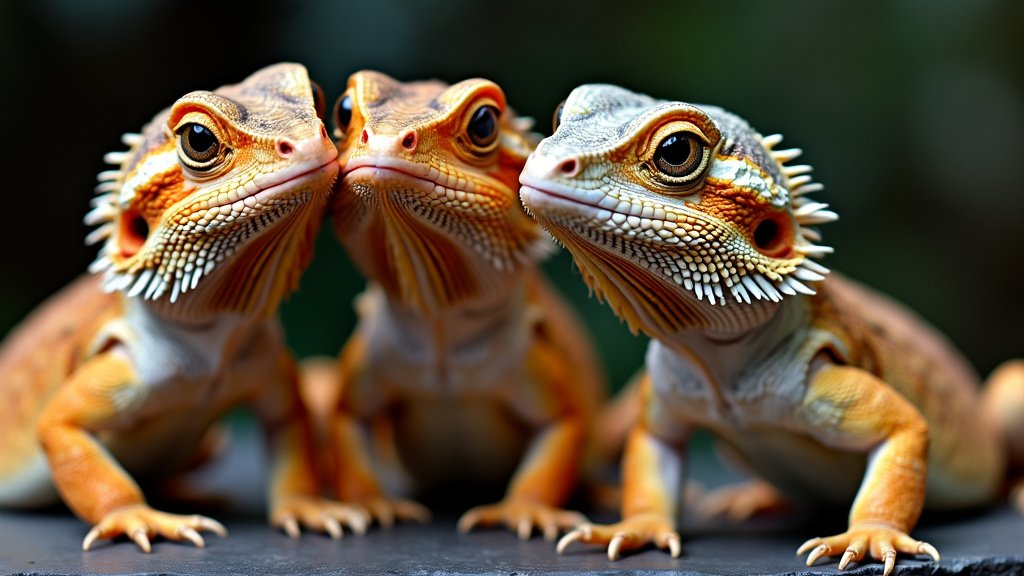Bearded dragons, with their unique appearances and fascinating behaviours, have become increasingly popular as pets. Their distinct morphs—genetic variations that give them their unique colours, patterns, and scalations—are a big draw for enthusiasts. However, with their growing popularity, numerous myths and misconceptions about bearded dragon morphs have surfaced. As a seasoned exotic pet owner, I’ll guide you through some of the most common myths and set the record straight.
The Basics of Bearded Dragon Morphs
Before diving into the myths, it’s essential to understand what a morph is. Morphs refer to the different genetic combinations that result in various appearances among bearded dragons. These can include differences in colour, pattern, and scales. Some popular morphs include the Red, Hypo, and Leatherback, each exhibiting its unique traits.
Myth 1: All Bearded Dragon Morphs Have the Same Health Needs
Different Morphs, Different Needs
One of the most pervasive myths is that all bearded dragon morphs have identical health requirements. While basic care (like UVB lighting, diet, and enclosure size) remains consistent, certain morphs may have additional needs.
- Hypomelanistic (Hypo) Dragons: These dragons lack melanin, which can make their skin more sensitive to light. Extra care in managing their UVB exposure is crucial.
- Leatherback Dragons: With smoother and fewer scales, these dragons can be more prone to skin abrasions and might require softer substrates to prevent injuries.
Health Check and Vet Consultation
It’s always a good idea to have a new pet morph checked by a reputable reptile vet who can offer tailored advice based on that particular morph’s needs. This step can go a long way in ensuring that your new bearded dragon morph remains healthy and happy.
Myth 2: More Vibrant Colours Mean a Healthier Dragon
The Colour Conundrum
A brightly coloured bearded dragon can be visually appealing, but it doesn’t necessarily equate to good health. The vibrancy of a dragon’s colour is largely determined by genetics and can vary significantly among individuals.
- Diet and Hydration: Proper nutrition and hydration play crucial roles in maintaining a dragon’s vitality, regardless of its colour.
- Environmental Factors: Adequate UVB lighting and the right temperature gradient are critical for a healthy metabolism and overall well-being.
Health Indicators to Watch
Rather than focusing solely on colour, pay attention to the following signs to gauge the health of your bearded dragon:
- Active Behaviour: A healthy dragon is typically alert and active.
- Regular Eating Habits: Consistent appetite and appropriate weight maintenance.
- Clear Eyes and Nose: Absence of discharge or cloudiness in the eyes or nose.
Myth 3: Breeding Morphs is Easy and Always Successful
The Realities of Breeding
Breeding bearded dragon morphs can be a complex and sometimes challenging process. It’s not merely about pairing two dragons and hoping for the best. Proper knowledge of genetics, responsible breeding practices, and understanding potential health issues are essential.
- Genetic Knowledge: Breeding two different morphs can produce varied and sometimes unpredictable results. For instance, breeding two leatherbacks can produce silkbacks, which are delicate and require meticulous care.
- Health Considerations: Inbreeding or improper pairing can result in genetic defects or health issues in the offspring.
Responsible Breeding Practices
If you’re considering breeding bearded dragons, extensive research and mentorship from experienced breeders are paramount. Ensure that the dragons you select are healthy and genetically diverse to promote robust offspring.
Conclusion
Understanding the nuances and debunking the myths surrounding bearded dragon morphs can lead to better care and a more rewarding experience for both you and your pet. Always remember that each morph may have its unique requirements and potential challenges. When in doubt, consult a vet or an experienced breeder for guidance.
Exploring the world of bearded dragon morphs is truly fascinating and brings joy to many reptile enthusiasts. By staying informed and debunking common myths, you’ll be well-equipped to provide the best care for your bearded dragon.
Internal Links:
- How to Set Up the Perfect Bearded Dragon Enclosure
- Top 5 Bearded Dragon Health Issues and How to Prevent Them
By avoiding common myths and understanding the critical aspects of care and breeding, you’ll ensure a happy, healthy life for your bearded dragon. So, embark on your reptilian adventure with confidence and curiosity!

